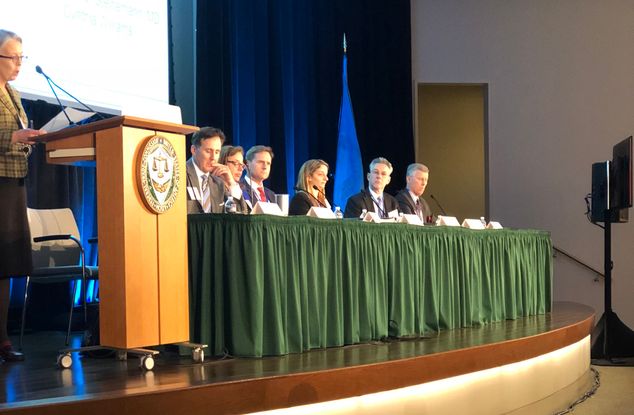Contact Lens Rule: Safeguarding Patients Who Use Contact Lenses
Issue
The Contact Lens Rule is an example of the many roles the federal government plays in health care. On one hand, it’s the Federal Trade Commission’s job to ensure our economy supports new and emerging markets, including how products reach consumers. On the other hand, contact lenses are classified by the government as Class II medical devices. This means their safety and effectiveness are overseen by the Food and Drug Administration via approval and regulation.
Physicians, meanwhile, want our patients to have these devices to improve their lives through better sight. We also want our patients to use contact lenses safely.
"You're not buying a pair of glasses, you're not buying a pair of shoes — you're buying a medical device," said Thomas Steinemann, MD, the Academy’s clinical lead on contact-lens safety issues. "Patients must work with an ophthalmologist to ensure proper care."
Because of the Contact Lens Rule, today's regulatory landscape facilitates patients’ access to more options for where they fill their contact-lens prescriptions, making it easier and less expensive to receive these medical devices. But it also has increased what lens prescribers must do. This extends to significant administrative responsibilities, including the expectation that they respond quickly to prescription-verification requests.
In 2015, the FTC launched its first review of the Contact Lens Rule since it was established more than a decade ago. The commission proposed changes that would actually increase administrative burdens on prescribers. Specifically, the FTC would have prescribers collect signed prescription-acknowledgement forms from every patient. These forms would need to be stored for a period of three years.
These changes do nothing to address existing patient-safety issues that have emerged since the marketplace’s expansion. One in particular, passive verification, results in patients with out-of-date prescriptions getting their lenses if their prescriber is unable to respond to a vendor request within a certain period of time.
The Academy is a vocal proponent for patient-safety considerations in contact-lens prescribing policy. We seek assurance that patient-safety concerns remain a core value as the marketplace — especially the online space — evolves.
The Academy’s stance can be summed up in a key phrase: ‘safety over sales.’ Another way to express our position is that it makes zero sense to soften important regulations that help us protect sight.
We also disagree with vendor suggestions that the FTC expand prescription expirations. We are adamant that any federal policy on contact lenses must align with our Refractive Errors & Refractive Surgery Preferred Practice Pattern® guideline. This includes recommendations of examining contact lens patients every 1-2 years.
Academy Action
Since the changes were proposed, we have vigorously opposed these unnecessary forms and urged the commission to instead focus on enhancing patient safety aspects of the Contact Lens Rule.
In March, Dr. Steinemann represented the Academy at a Federal Trade Commission workshop that discussed changes to the Contact Lens Rule. We're urging the FTC to make patient safety its top priority in any final update to the rule.
"It's clear that changes to the contact lens rule are driven by economic interests and that it's important for ophthalmology to be in that room to give our side of the story to advocate on behalf of the health issues related to contact lens wear," Dr. Steinemann said.
To promote patient safety, the Academy has also called for improvements to the flawed passive-verification system. The Academy wants the eight-business-hour verification window expanded. We’ve called for this in previous comments, only to have the FTC ignore this request.

Thomas Steinemann, MD, second from right, participates on a FTC panel discussing potential changes to the Contact Lens Rule.
Impact
We’re forcing federal policy makers to pay attention to very real patient-safety concerns in today’s policies. Every time we submit comments or participate in an FTC workshop or meet with agency leaders, we help prescribers speak out against commercially driven interests. We’ll continue to make evidence-based recommendations that protect patients’ health, while maintaining the ease-of-access they deserve.